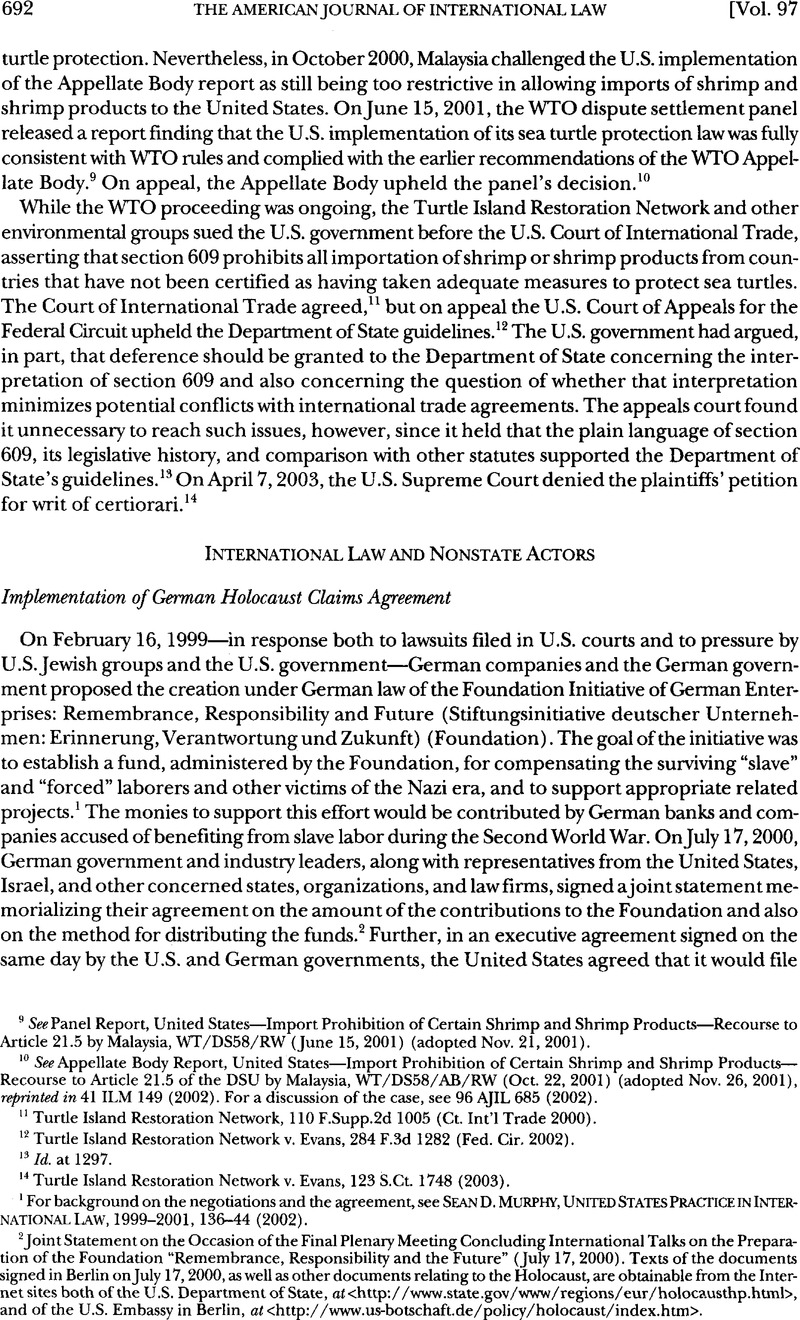Article contents
Implementation of German Holocaust Claims Agreement
Published online by Cambridge University Press: 10 March 2017
Abstract

- Type
- Contemporary Practice of the United States Relating to International Law
- Information
- Copyright
- Copyright © American Society of International Law 2003
References
1 For background on the negotiations and the agreement, see Sean D. Murphy, United States Practice in International Law, 1999–2001, 136–44 (2002).
2 Joint Statement on the Occasion of the Final Plenary Meeting Concluding International Talks on the Preparation of the Foundation “Remembrance, Responsibility and the Future” (July 17, 2000). Texts of the documents signed in Berlin on July 17,2000, as well as other documents relating to the Holocaust, are obtainable from the Internet sites both of the U.S. Department of State, at <http://www.state.gov/www/regions/eur/holocausthp.html>, and of the U.S. Embassy in Berlin, at <http://www.us-botschaft.de/policy/holocaust/index.htm>.
3 Agreement Concerning the Foundation “Remembrance, Responsibility and the Future,”July 17,2000, U.S.-FRG, Annex B, 39ILM 1298,1303 (2000). The United States concluded similar agreements with both Austria and France concerning claims against their respective industries.
4 In re Cases Against German Defendants Litigation, 198 F.R.D. 429 (D.N.J. 2000); In re Nazi Era Cases Against German Defendants Litigation, 129 F.Supp.2d 370 (D.N J. 2001). For recent cases concerning claims against Japanese companies for slave labor, see Sean D. Murphy, Contemporary Practice of the United States, 97 AJIL 432 (2003).
5 Complaint (filedJune 18,2001), Ungaro-Benages v. Dresdner Bank, No. 01–CV-2547 (S.D. Fla. Feb. 14,2003).
6 Statement of Interest of the United States (filed Jan. 18, 2002), Ungaro-Benages v. Dresdner Bank. On May 20, 2002, the plaintiff moved to strike the statement of interest, principally on grounds that the U.S.-Germany executive agreement (1) amounted to a taking in violation of the Fifth Amendment, and (2) was in derogation of a 1952 U.S.-Germany “transition agreement.” See Convention on Relations Between the Three Powers and the Federal Republic of Germany, May 26,1952,331 UNTS 327, as amended by Schedule I to the Protocol on the Termination of the Occupation Regime in the Federal Republic of Germany, Oct. 23 1954, 332 UNTS 219.
The district court declined to strike the statement of interest. The court stated that there could be no taking in violation of the Fifth Amendment since the statement of interest was only suggesting that dismissal of the action would serve the foreign policy interests of the United States if there was some basis in law that would justify a dismissal. See Ungaro-Benages v. Dresdner Bank, slip op. at 7. With respect to the 1952 transition agreement, the court noted, among other things, that the requirements of the transition agreement had “long been substantially fulfilled” by 2000 and had, in fact, “been terminated in pertinent part” by a 1990 exchange of diplomatic notes. Id. at 8–9; see Exchange of Notes, UK-FRG-Fr.-U.S., Sept. 27–28, 1990, 1556 UNTS 30.
7 Statement of Interest of the United States, supra note 6, at 14–20 (citations omitted) (the quotations are from a statement by former U.S. Secretary of State Madeleine Albright attached as exhibit four to the statement of interest).
8 369 U.S. 186(1962).
9 Ungaro-Benages v. Dresdner Bank, slip op. at 10–16.
10 Id. at 16–21.
11 Id. at 20.
12 Id. at 27–29.
13 Id. at 23–27.
14 Id. at 29–32 (citing Tel-Oren v. Libyan Arab Republic, 726 F.2d 774 (D.C. Cir. 1984), Handel v. Artukovic, 601 F.Supp. 1421 (CD. Cal.1985), and Kadic v. Karadzic, 70 F.3d 232 (2d Cir. 1995)).
15 Id. at 32–33.
- 1
- Cited by




